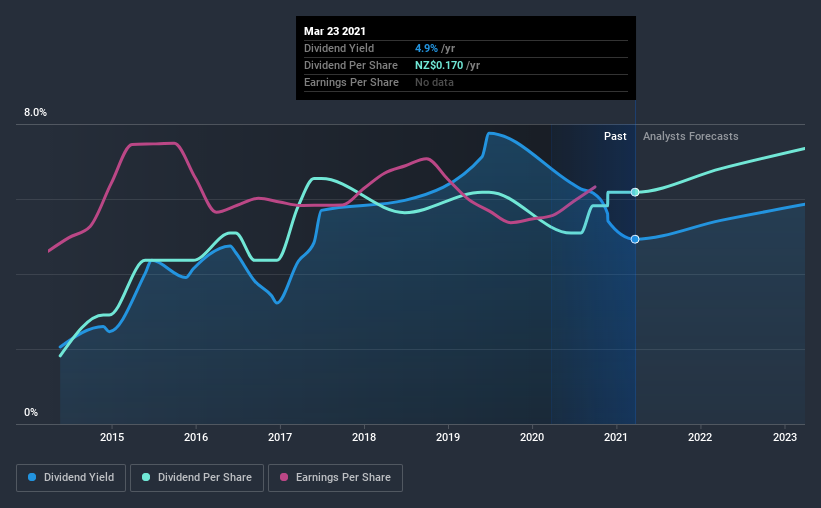- New Zealand
- /
- Specialty Stores
- /
- NZSE:TRA
Is Turners Automotive Group Limited (NZSE:TRA) A Strong Dividend Stock?

Could Turners Automotive Group Limited (NZSE:TRA) be an attractive dividend share to own for the long haul? Investors are often drawn to strong companies with the idea of reinvesting the dividends. If you are hoping to live on your dividends, it's important to be more stringent with your investments than the average punter. Regular readers know we like to apply the same approach to each dividend stock, and we hope you'll find our analysis useful.
With a goodly-sized dividend yield despite a relatively short payment history, investors might be wondering if Turners Automotive Group is a new dividend aristocrat in the making. We'd agree the yield does look enticing. Some simple research can reduce the risk of buying Turners Automotive Group for its dividend - read on to learn more.
Click the interactive chart for our full dividend analysis

Payout ratios
Dividends are typically paid from company earnings. If a company pays more in dividends than it earned, then the dividend might become unsustainable - hardly an ideal situation. As a result, we should always investigate whether a company can afford its dividend, measured as a percentage of a company's net income after tax. Looking at the data, we can see that 51% of Turners Automotive Group's profits were paid out as dividends in the last 12 months. A payout ratio above 50% generally implies a business is reaching maturity, although it is still possible to reinvest in the business or increase the dividend over time.
Another important check we do is to see if the free cash flow generated is sufficient to pay the dividend. Turners Automotive Group paid out 106% of its free cash flow last year, which we think is concerning if cash flows do not improve. While Turners Automotive Group's dividends were covered by the company's reported profits, free cash flow is somewhat more important, so it's not great to see that the company didn't generate enough cash to pay its dividend. Cash is king, as they say, and were Turners Automotive Group to repeatedly pay dividends that aren't well covered by cashflow, we would consider this a warning sign.
Remember, you can always get a snapshot of Turners Automotive Group's latest financial position, by checking our visualisation of its financial health.
Dividend Volatility
One of the major risks of relying on dividend income, is the potential for a company to struggle financially and cut its dividend. Not only is your income cut, but the value of your investment declines as well - nasty. Looking at the data, we can see that Turners Automotive Group has been paying a dividend for the past seven years. Although it has been paying a dividend for several years now, the dividend has been cut at least once, and we're cautious about the consistency of its dividend across a full economic cycle. During the past seven-year period, the first annual payment was NZ$0.05 in 2014, compared to NZ$0.2 last year. Dividends per share have grown at approximately 19% per year over this time. Turners Automotive Group's dividend payments have fluctuated, so it hasn't grown 19% every year, but the CAGR is a useful rule of thumb for approximating the historical growth.
Turners Automotive Group has grown distributions at a rapid rate despite cutting the dividend at least once in the past. Companies that cut once often cut again, but it might be worth considering if the business has turned a corner.
Dividend Growth Potential
With a relatively unstable dividend, it's even more important to evaluate if earnings per share (EPS) are growing - it's not worth taking the risk on a dividend getting cut, unless you might be rewarded with larger dividends in future. It's not great to see that Turners Automotive Group's have fallen at approximately 3.3% over the past five years. A modest decline in earnings per share is not great to see, but it doesn't automatically make a dividend unsustainable. Still, we'd vastly prefer to see EPS growth when researching dividend stocks.
We'd also point out that Turners Automotive Group issued a meaningful number of new shares in the past year. Trying to grow the dividend when issuing new shares reminds us of the ancient Greek tale of Sisyphus - perpetually pushing a boulder uphill. Companies that consistently issue new shares are often suboptimal from a dividend perspective.
Conclusion
When we look at a dividend stock, we need to form a judgement on whether the dividend will grow, if the company is able to maintain it in a wide range of economic circumstances, and if the dividend payout is sustainable. First, we think Turners Automotive Group has an acceptable payout ratio, although its dividend was not well covered by cashflow. Second, earnings per share have been in decline, and its dividend has been cut at least once in the past. Using these criteria, Turners Automotive Group looks quite suboptimal from a dividend investment perspective.
Companies possessing a stable dividend policy will likely enjoy greater investor interest than those suffering from a more inconsistent approach. However, there are other things to consider for investors when analysing stock performance. Just as an example, we've come accross 2 warning signs for Turners Automotive Group you should be aware of, and 1 of them is a bit concerning.
We have also put together a list of global stocks with a market capitalisation above $1bn and yielding more 3%.
When trading Turners Automotive Group or any other investment, use the platform considered by many to be the Professional's Gateway to the Worlds Market, Interactive Brokers. You get the lowest-cost* trading on stocks, options, futures, forex, bonds and funds worldwide from a single integrated account. Promoted
Valuation is complex, but we're here to simplify it.
Discover if Turners Automotive Group might be undervalued or overvalued with our detailed analysis, featuring fair value estimates, potential risks, dividends, insider trades, and its financial condition.
Access Free AnalysisThis article by Simply Wall St is general in nature. It does not constitute a recommendation to buy or sell any stock, and does not take account of your objectives, or your financial situation. We aim to bring you long-term focused analysis driven by fundamental data. Note that our analysis may not factor in the latest price-sensitive company announcements or qualitative material. Simply Wall St has no position in any stocks mentioned.
*Interactive Brokers Rated Lowest Cost Broker by StockBrokers.com Annual Online Review 2020
Have feedback on this article? Concerned about the content? Get in touch with us directly. Alternatively, email editorial-team (at) simplywallst.com.
About NZSE:TRA
Turners Automotive Group
Engages in the automotive retail business in New Zealand and Australia.
Fair value with acceptable track record.


